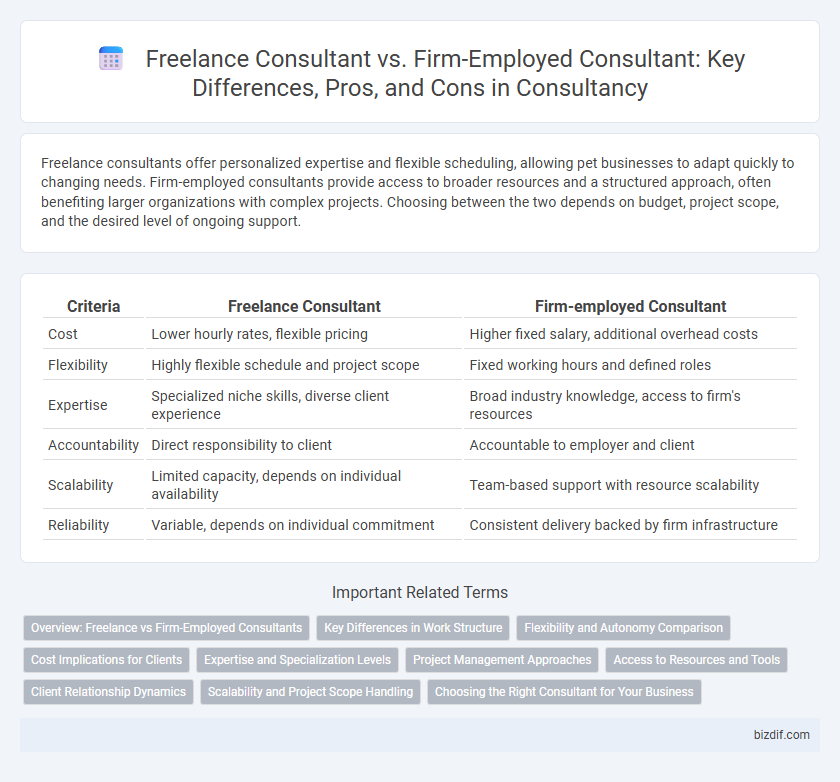Freelance consultants offer personalized expertise and flexible scheduling, allowing pet businesses to adapt quickly to changing needs. Firm-employed consultants provide access to broader resources and a structured approach, often benefiting larger organizations with complex projects. Choosing between the two depends on budget, project scope, and the desired level of ongoing support.
Table of Comparison
| Criteria | Freelance Consultant | Firm-employed Consultant |
|---|---|---|
| Cost | Lower hourly rates, flexible pricing | Higher fixed salary, additional overhead costs |
| Flexibility | Highly flexible schedule and project scope | Fixed working hours and defined roles |
| Expertise | Specialized niche skills, diverse client experience | Broad industry knowledge, access to firm's resources |
| Accountability | Direct responsibility to client | Accountable to employer and client |
| Scalability | Limited capacity, depends on individual availability | Team-based support with resource scalability |
| Reliability | Variable, depends on individual commitment | Consistent delivery backed by firm infrastructure |
Overview: Freelance vs Firm-Employed Consultants
Freelance consultants offer greater flexibility and often provide specialized expertise tailored to specific client needs, operating independently without long-term commitments. Firm-employed consultants benefit from structured support, access to extensive resources, established methodologies, and collaborative teams within the consulting company. Both roles require strong analytical skills and industry knowledge, but freelance consultants emphasize autonomy and direct client relationships, while firm-employed consultants focus on scalability and comprehensive solutions.
Key Differences in Work Structure
Freelance consultants typically operate with greater autonomy, managing multiple clients independently and setting their own schedules, whereas firm-employed consultants work within structured teams and adhere to corporate protocols and fixed hours. Firms provide extensive resources, training, and steady project pipelines, contrasting with freelancers who rely on self-sourced opportunities and on-demand skill development. The variability in workload and income stability often distinguishes freelance consultants from those with the consistent salary and benefits characteristic of firm employment.
Flexibility and Autonomy Comparison
Freelance consultants offer greater flexibility and autonomy by setting their own schedules, choosing projects aligned with their expertise, and working remotely from various locations. Firm-employed consultants typically have structured hours, assigned projects, and must adhere to company policies and supervision, which can limit personal control but provide steady resources and support. The choice between the two depends on prioritizing independence and lifestyle versus stability and collaboration within an established organization.
Cost Implications for Clients
Freelance consultants typically offer lower hourly rates than firm-employed consultants due to reduced overhead costs and flexible pricing structures, making them a cost-effective option for clients with budget constraints. Firm-employed consultants often come with higher fixed fees reflecting the benefits of extensive resources, formalized processes, and brand reputation, which can increase overall project expenses. Clients must balance cost implications with the scope of expertise and risk management when choosing between freelance and firm-employed consultants.
Expertise and Specialization Levels
Freelance consultants often possess niche expertise and deep specialization in particular industries or technical domains, enabling tailored solutions for specific client needs. Firm-employed consultants typically benefit from broader organizational resources, collaborative knowledge, and structured professional development, which can enhance multidisciplinary project execution. Expertise levels in freelance consultants are frequently distinguished by direct project experience and client feedback, while firm consultants' specialization is reinforced by internal training and standardized methodologies.
Project Management Approaches
Freelance consultants often adopt agile project management approaches, allowing for flexibility and rapid adjustments tailored to specific client needs, whereas firm-employed consultants typically follow structured, standardized methodologies aligned with corporate policies to ensure consistency across projects. Freelancers leverage direct client engagement and adaptable tools to enhance communication and streamline processes, contrasting with firm-employed consultants who benefit from established frameworks, resources, and cross-functional team support. Project scope management and risk assessment vary between the two, with freelancers emphasizing personalized planning and firm consultants integrating comprehensive risk mitigation strategies embedded in organizational standards.
Access to Resources and Tools
Freelance consultants often have limited access to extensive resources and proprietary tools compared to firm-employed consultants who benefit from their employer's established infrastructure, including specialized software, research databases, and collaborative platforms. Firms provide ongoing training and centralized support, enhancing consultants' ability to leverage advanced methodologies and industry insights. This access impacts the scope and efficiency of project delivery, with firm-employed consultants typically able to offer more comprehensive solutions due to their enhanced resource availability.
Client Relationship Dynamics
Freelance consultants often build highly personalized client relationships through direct communication and tailored solutions, fostering trust and flexibility in project management. In contrast, firm-employed consultants may follow standardized protocols and leverage organizational resources, which can lead to more structured but less intimate client interactions. The choice between freelance and firm-employed consultants significantly impacts client engagement styles, responsiveness, and the overall dynamic of collaboration.
Scalability and Project Scope Handling
Freelance consultants offer flexible scalability by adjusting their workload based on project demands, ideal for specialized tasks or short-term needs. Firm-employed consultants provide extensive resources and collaborative teams enabling them to handle larger, more complex projects with broader scopes efficiently. The choice depends on whether a project requires agile, individualized expertise or comprehensive, multi-disciplinary support.
Choosing the Right Consultant for Your Business
Freelance consultants offer specialized expertise and flexibility, often providing personalized attention and cost-effective solutions tailored to specific projects. Firm-employed consultants bring extensive resources, structured methodologies, and diverse industry experience, ensuring comprehensive support for complex business challenges. Evaluating your business needs, project scope, and budget will guide you in selecting between the agility of a freelance consultant and the scalability of a firm-employed consultant.
Freelance Consultant vs Firm-employed Consultant Infographic

 bizdif.com
bizdif.com